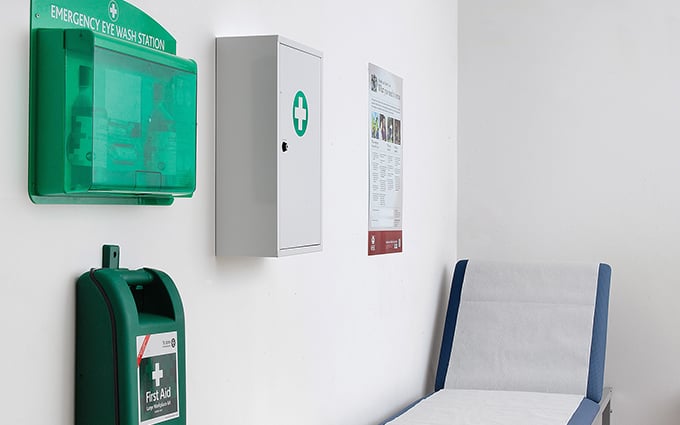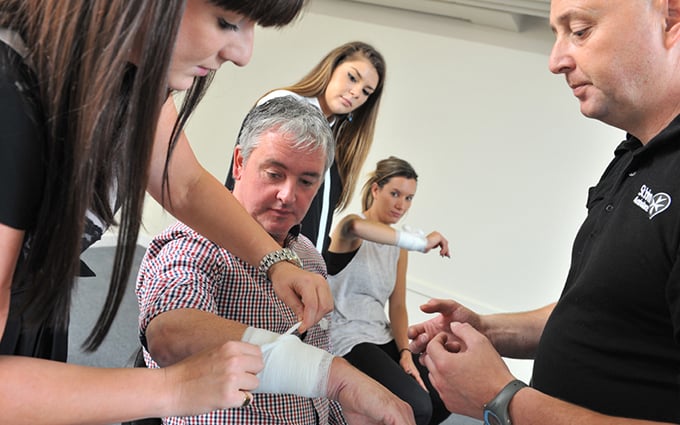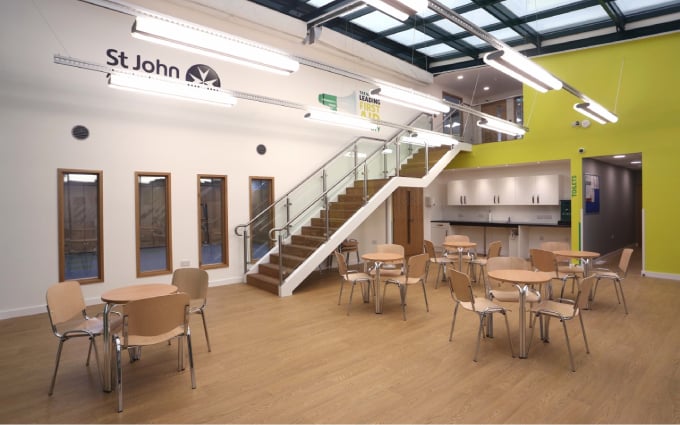Published: 8th January 2025.
Last updated: 8th January 2025.
Author: Lisa Sharman, National Head of Education & Commercial Training at St John Ambulance.
With 16.4 million workdays lost to mental health in the UK in 2023, Lisa Sharman, National Head of Education & Commercial Training at St John Ambulance, advocates for a comprehensive approach to workplace first aid that addresses both physical and mental health to improve employee wellbeing and reduce costs.
Proactive as well as reactive: a holistic approach to workplace health
The traditional idea of workplace first aid is outdated. Gone are the days when it meant treating a physical injury or illness or an appointed person maintaining an emergency medical kit in the corner of the office. Today's progressive organisations recognise that first aid is a core component of employee wellbeing – and it demands a more sophisticated approach.
This means strengthening the reactive model of grabbing your workplace first aid kit to treat injuries and illness with the inclusion of a proactive strategy that addresses both physical and mental wellbeing. This 'one body' approach is based on a critical insight: mental and physical health are deeply interconnected.
That’s why, at St John Ambulance, we offer courses in both physical first aid and mental health first aid, ensuring organisations are equipped to support the holistic health of their workforce.
Instead of treating symptoms alone, this model focuses on prevention and supporting comprehensive employee wellness. It's not just about responding to health emergencies – it's about creating a workplace environment that fosters total health.
But this shift isn't just compassionate; it's strategic. By investing in whole-person health approaches, organisations can reduce incidents and build more resilient, productive teams.
A shift in approach
Many people’s idea of a workplace first aid function is one that goes largely unnoticed until someone hurts themselves or gets sick. This traditional approach has a narrow focus on physical injuries or illness and the immediate medical response.
But the workplace has changed, health requirements are evolving, and people’s expectations of their employer have shifted.
There has been a sharp rise in the number of people not working because of sickness in the UK. Around 2.8 million people in the UK were ‘economically inactive’ because of long-term sickness at the start of 2024. Just a few years ago, the main reason for people to be out of work was because they were looking after family, but long-term and temporary sick leave have now overtaken this.
What’s more, many of the common reasons for long-term sick leave are due to mental health conditions. Here, traditional narrow concepts of first aid have contributed to significant gaps in knowledge, understanding and support around mental health challenges.
It’s also important to note that the rise of remote and hybrid working has created a new dynamic for employers and their commitment to health and wellbeing. The blurring lines between work and other aspects of life have brought their obligations into the spotlight.
This is why the modern workplace demands a different approach to first aid. A holistic workplace first aid strategy draws on physical health interventions, mental health support, preventative training, and integrated wellness programmes. Employers should consider training courses in both first aid at work as well as mental health first aid.
Taking this approach means organisations aren’t just dealing with an immediate problem – they are contributing to improved employee resilience, reduced workplace incidents and enhanced overall organisational health. In addition, having trained mental health first aiders in place can also help break down taboos and encourage people to seek help earlier – which in turn helps curb sick leave and staff turnover.
The economic argument
If the arguments about employee wellbeing weren’t compelling enough, there are also clear financial benefits to taking a holistic approach.
More than 33 million working days were lost in Britain in 2023/4 as a result of injury and illness. Those days are down to over a million people being made ill or injured by their work each year.
In recent years there has also been a marked rise in the number of people taking sick leave because of mental health. Stress, depression or anxiety led to 16.4 million days off work in 2023/24. Indeed, recent updates from the Health and Safety Executive (HSE) highlight how vital it is for employers to include mental health support as part of their first aid needs assessment.
Besides the direct costs of compensation, legal and administrative costs associated with workplace incidents, there is also a significant productivity cost for organisations.
On average each injury costs a business £1,900 or nearly £8,000 for injuries resulting in a week or more off work, according to figures from the HSE. An illness lasting seven or more days costs £9,200 per case. And once the expenses for the individual and society as a whole are considered, these costs rise substantially.
When you factor in risk mitigation and reduced employer liability it’s not hard to see how organisations could quickly recoup their investment on a comprehensive wellbeing, health and safety programme.
But implementing a holistic health approach is more than a policy – it's a commitment.
It requires ongoing investment in training, open communication and a genuine culture of care. By treating employees as whole individuals and prioritising both mental and physical wellness, organisations can create safer, more resilient, and more productive workplaces.
The message is clear: comprehensive health is no longer optional. It's the foundation of modern, responsible workplace management.
Click here to learn more about the courses on offer at St John Ambulance.









